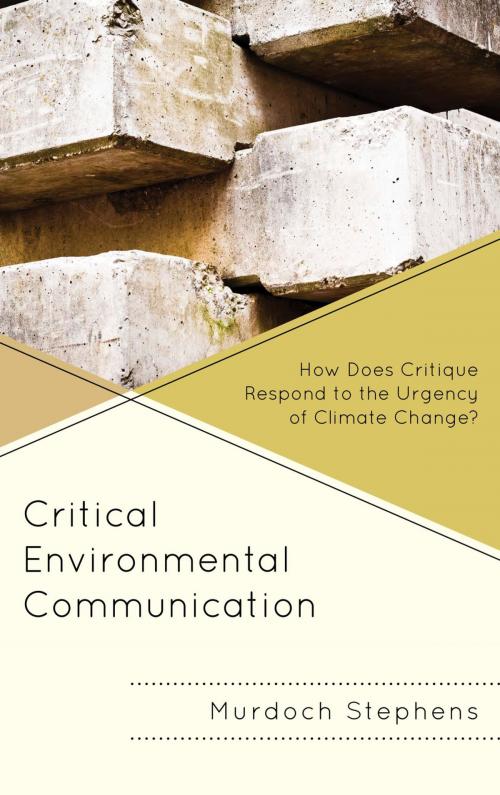Critical Environmental Communication
How Does Critique Respond to the Urgency of Climate Change?
Nonfiction, Reference & Language, Language Arts, Communication, Social & Cultural Studies, Social Science| Author: | Murdoch Stephens | ISBN: | 9781498570886 |
| Publisher: | Lexington Books | Publication: | April 25, 2018 |
| Imprint: | Lexington Books | Language: | English |
| Author: | Murdoch Stephens |
| ISBN: | 9781498570886 |
| Publisher: | Lexington Books |
| Publication: | April 25, 2018 |
| Imprint: | Lexington Books |
| Language: | English |
How do contemporary critical thinkers find a way to work between the doubt that grounds their thinking and the knowing needed to ground emancipatory political struggles? In this overview of four contemporary thinkers’—Timothy Morton, Peter Sloterdijk, Slavoj Žižek, and Bruno Latour—approaches to critique and climate change, communication scholar Murdoch Stephens discusses and analyses the fissures, elisions, and paradoxes that inform critical theory. This book delves into how critical theory offers important insights for those interested in climate change, but also how critical theory faces challenges to its constitution when faced with issues that are both urgent and yet require a scientific rigour that is not the specialty of critique. Written from the perspective of the interdisciplinary field of environmental communication, Critical Environmental Communication: How Does Critique Respond to the Urgency of Climate Change? argues for re-orienting the field towards the tensions and possibilities drawn from these four authors.
How do contemporary critical thinkers find a way to work between the doubt that grounds their thinking and the knowing needed to ground emancipatory political struggles? In this overview of four contemporary thinkers’—Timothy Morton, Peter Sloterdijk, Slavoj Žižek, and Bruno Latour—approaches to critique and climate change, communication scholar Murdoch Stephens discusses and analyses the fissures, elisions, and paradoxes that inform critical theory. This book delves into how critical theory offers important insights for those interested in climate change, but also how critical theory faces challenges to its constitution when faced with issues that are both urgent and yet require a scientific rigour that is not the specialty of critique. Written from the perspective of the interdisciplinary field of environmental communication, Critical Environmental Communication: How Does Critique Respond to the Urgency of Climate Change? argues for re-orienting the field towards the tensions and possibilities drawn from these four authors.















